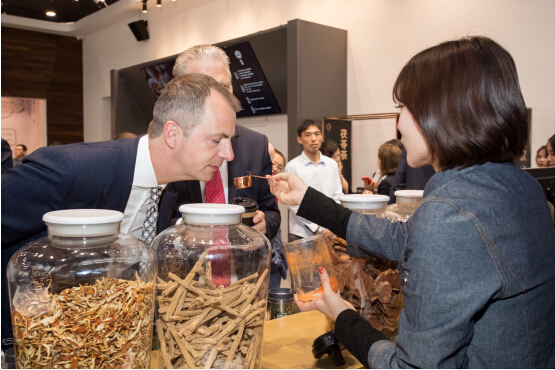China has those places where coffee is grown Yunnan small coffee Yunnan Baoshan coffee

Professional coffee knowledge exchange more coffee bean information please follow the coffee workshop (Wechat official account cafe_style)
Coffee producing areas in China are mainly in Hainan, Yunnan, Guangdong and Taiwan. Northern Hainan Island, southern Yunnan Province, located between 15 degrees north latitude and the Tropic of Cancer, its coffee is strong but not bitter, fragrant but not strong, very unique. And with a little fruit flavor, it is the top grade of coffee, which is highly praised internationally. In addition, in the fifties and sixties, Yongchun, Xiamen and Zhaoan in Fujian Province, Xichang in Sichuan Province and western Guangdong Province also tried to grow coffee, and there was a peak period of coffee production and development.
Coffee cultivation in Hainan is mainly concentrated in Fushan and Xinglong. Since 2009, Wanning and other places have begun to revitalize the coffee industry and encourage farmers to expand their cultivation.
Coffee has been cultivated in Guangxi for more than 50 years, mainly in Jingxi, Mubian, Long John and Baise. In addition, in the fifties and sixties, Yongchun, Xiamen and Zhaoan in Fujian Province, Xichang in Sichuan Province and western Guangdong Province also tried to grow coffee, and there was a peak period of coffee production and development.
Taiwan is located in the subtropics, the territory is mountainous, and there is an obvious rainy season. As far as coffee is concerned, it is a good growing environment for coffee. Since the British introduced coffee trees during Guang Xu's time, they are still planted on a small scale. The more famous producing areas are Huilin Farm (more than 1000 meters above sea level) in Nantou Mountain area and Hebao Mountain in Yunlin Ancient Keng (294 meters above sea level). Coffee flavor is similar to Central and South American beans, has a soft sour taste and good texture, mild taste.
Yunnan is the main coffee bean producing area in China. Yunnan is located in the subtropical mountain climate zone south of the Tropic of Cancer, with unique plateau red soil, fertile and loose soil and mild climate, which is especially suitable for growing small-grain coffee. Yunnan Province, where the planting area and output account for more than 90% of the country, is mainly distributed in Simao, Banna, Wenshan, Baoshan, Dehong and other areas in the south and southwest of Yunnan.
Yunnan coffee was first introduced in 1902.
Introduced by Chinese missionaries, there are still 24 coffee trees with an age of more than 90 years in Zhukula Township, Binchuan County. In 1914, the border people of the Ruili Jingpo nationality were introduced from Burma to Nongxian Village. Tibika and Bobang, two classic high-quality coffee varieties, are the main cultivated varieties of coffee in Yunnan. Because the morphology and habits of the two varieties are similar, the two varieties are mostly mixed. Bobang terminal bud tender leaves are green, called green top coffee; Tiebika top leaves are red copper, called red top coffee.
After inspecting the coffee planting and primary processing base in Yunnan, international coffee organization tasting experts rated Yunnan coffee as the kind of small seed coffee processed by Colombian wet processing, which is the highest quality coffee in the world.
At present, Yunnan coffee is mainly distributed in 11 prefectures and cities, such as Baoshan, Simao, Yuxi and Dehong. Among them, the quality of coffee in Baoshan and Simao area is the best.
Lujiangba in the dry and hot valley is the "tropical treasure house" of Baoshan. The average temperature in the dam is 21.5℃, the highest is 40.4 ℃, and there is almost no frost all the year round. The small grains of coffee cultivated here are strong but not bitter, fragrant but not strong, small and well-proportioned, mellow and fruity.
In 1984, Nestl é used Pu'er as an important coffee raw material production base; in 2012, Starbucks opened a grower support center in Yunnan Pu'er, and in 2018 it opened its first coffee origin store in Pu'er, followed by Yunnan Zhenxuan coffee beans in stores across the country. The boutique coffee brand Seesaw Coffee sends professionals to Yunnan every October to help local coffee farmers cultivate coffee seedlings and regulate picking and handling. More and more people begin to focus on the rural land of Yunnan.
The Starbucks Yunnan Coffee Project is an important witness that Starbucks has been ploughing the Chinese market for many years, giving back to its communities, and cooperating with and growing together with the Chinese coffee industry. Full of our sincere respect for the Chinese coffee growing industry, it is the result of our continuous efforts to improve Starbucks' value contribution in China, that is, from coffee cultivation to providing customers with a pure Starbucks experience in stores.
END
Important Notice :
前街咖啡 FrontStreet Coffee has moved to new addredd:
FrontStreet Coffee Address: 315,Donghua East Road,GuangZhou
Tel:020 38364473
- Prev

Tongrentang Health VS Starbucks, Coffee? Tea? Great health?
For more information on coffee beans, please follow the coffee workshop (Wechat official account cafe_style). Perhaps, before today, no one would have associated Tongrentang, a national brand representing Chinese medicine culture, with the prevailing coffee culture in the West. Perhaps, in the eyes of many people, Eastern culture is like water, nourishing everything silently, and Western culture is like fire.
- Next

The world's first coffee shop, Flower God Cafe.
Professional coffee knowledge exchange more coffee bean information Please pay attention to Coffee Workshop (Wechat official account cafe_style) in fact, the earliest coffee culture appeared in the Arabian Peninsula, but the earliest large-scale commercial coffee shop appeared in Turkey, but due to incomplete historical materials, there is no way to verify the earliest coffee shop in Turkey. Even so, we can't deny that it is true.
Related
- The ceremony is full! Starbucks starts to cut the ribbon at a complimentary coffee station?!
- A whole Michelin meal?! Lucky launches the new "Small Butter Apple Crispy Latte"
- Three tips for adjusting espresso on rainy days! Quickly find the right water temperature, powder, and grinding ratio for espresso!
- How much hot water does it take to brew hanging ear coffee? How does it taste best? Can hot water from the water dispenser be used to make ear drip coffee?
- What grade does Jamaica Blue Mountain No. 1 coffee belong to and how to drink it better? What is the highest grade of Blue Mountain coffee for coffee aristocrats?
- What are the flavor characteristics of the world-famous coffee Blue Mountain No. 1 Golden Mantelin? What are the characteristics of deep-roasted bitter coffee?
- Can I make coffee a second time in an Italian hand-brewed mocha pot? Why can't coffee be brewed several times like tea leaves?
- Hand-brewed coffee flows with a knife and a tornado. How to brew it? What is the proportion of grinding water and water temperature divided into?
- What is the difference between Indonesian Sumatra Mantinin coffee and gold Mantinin? How to distinguish between real and fake golden Mantelin coffee?
- What does bypass mean in coffee? Why can hand-brewed coffee and water make it better?

